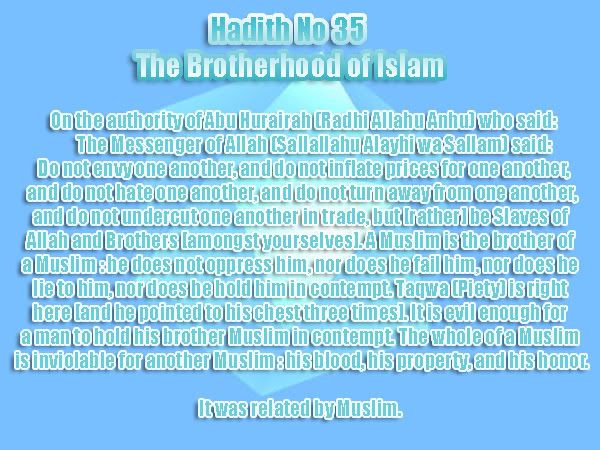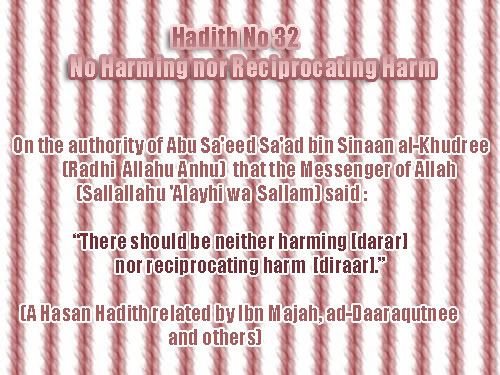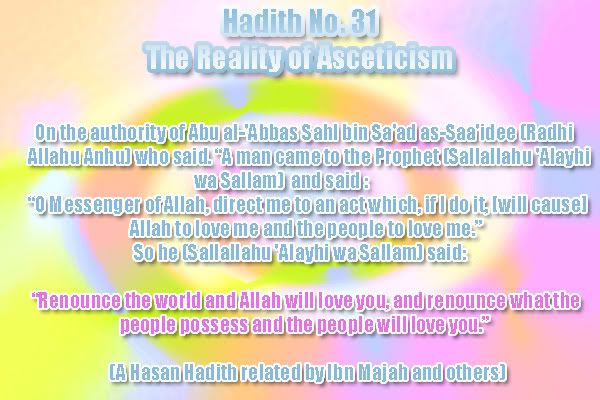
http://www.islaam.net/main/display.php?id=224&category=24
Explanation of Hadeeth Number 35
Regarding his (sallAllaahu alayhi wa sallam) statement "Do not envy one another": envy (al-hasad) is the desire that a blessing is removed from someone else, and this is forbidden. And in another hadeeth "Do not have envy (hasad), for verily envy eats away good deeds the way fire consumes firewood or grass". As for al-ghibtah then it is the desire to obtain what another fortunate person possesses without wishing that he loses that blessing. And sometimes the word al-hasad is used in the place of al-ghibtah due to the proximity of meaning of the two, as in the statement of the Prophet (sallAllaahu alayhi wa sallam): "There is to be no hasad except in two cases ... ", meaning here "There is to be no ghibtah except in two cases".
And his (sallAllaahu alayhi wa sallam) statement "do not inflate prices for one another" then the word used here in Arabic is 'najasha', and the origin of this word carries the meaning of cheating, deception and swindling. And the Arabs sometimes call a hunter a 'naajish' because he deceives and outsmarts the animal he hunts. And his (sallAllaahu alayhi wa sallam) statement "do not hate one another" means do not adopt the means that lead to hatred. This is because love and hate are matters of the heart, such that mankind does not possess full ability to control them, nor are they able to bring about change in them. And this is as the Prophet (sallAllaahu alayhi wa sallam) said [regarding the division of time he had made between his wives]: "Oh Allaah this division is what I have been able to do, so do not take me to account for that which you control, and over which I have no control", meaning by this his heart.
And "turning away" means enmity, and it has also been said that it means cutting off relations or boycotting. And his (sallAllaahu alayhi wa sallam) statement "and do not undercut one another in trade" is referring to the situation where a buyer has almost completed a contract with a seller, and during the final time of choice a second seller approaches him and says: "If you revoke this sale then I will sell to you the same thing or better than it for the same price". Or, if a buyer and seller have agreed upon a price and are pleased with it, and only the completion of the contract remains, and then a second seller offers to give more for the same price, or to give the same goods at a lower price, then this is forbidden as it occurs after agreement on the price has taken place and the buyer and seller have been pleased with it. However, if the second seller makes his offer before they are pleased with the price then this is not forbidden.
And the meaning of "but be you, O servants of Allaah, brothers" means deal with one another and live together amiably with brotherhood, and treat one another with love, kindness, compassion and courteousness, and help one another upon goodness, while always having a clear heart and offering sincere advice in all situations.
And regarding his (sallAllaahu alayhi wa sallam) statement "A Muslim is the brother of a Muslim: he does not oppress him, nor does he fail him, nor does he lie to him nor does he hold him in contempt": to fail someone means to leave helping or aiding him, so if a Muslim were to seek ones help in defending himself from an oppressor or similar to that, then it is necessary to help him if one is able to, and one has no shar'ee excuse for not doing so.
And his (sallAllaahu alayhi wa sallam) statement "nor does he hold him in contempt" means that he does not behave haughtily towards another Muslim, so as to belittle him.
And his (sallAllaahu alayhi wa sallam) statement "Taqwaa (piety) is right here [and he pointed to his chest three times]" and in another narration "Verily Allaah does not look at your bodies nor at your appearances, but rather he looks at your hearts". This means that the apparent actions of the limbs do not, by themselves, attain for one taqwaa. But rather taqwaa is attained through what is in the heart of appreciating the greatness of Allaah the exalted, and having fear of Him and having recognition of Him, and knowing that the sight of Allaah encompasses all things. And so the meaning of the hadeeth, and Allaah knows best, is the taking of the self to account, and the point of observation of all of this is by the heart.
And his (sallAllaahu alayhi wa sallam) statement "It is enough evil for a man to hold his Muslim brother in contempt" contains a severe warning from doing so, since Allaah ta'aalaa did not look upon him in contempt when He created him, and nourished him, and then perfected his outward appearance, and then subdued whatever is in the heavens and whatever is in the Earth for his sake. And even though He did this for others along with him, no doubt he has a share in it. Then after that, Allaah - subhaanahu - named him a Muslim and a believer and a slave, and his command extended to the extent that he made the Messenger that He sent to him Muhammad (sallAllaahu alayhi wa sallam). So whoever treats with contempt a Muslim from amongst the Muslims, then he has treated with contempt one whom Allaah 'azza wa jall has granted greatness and nobility, and no doubt that is sufficient for him. And so from treating a Muslim with contempt is not to send the greeting of salaam upon him if he passes by him, and not to reply to his greeting of salaam if he begins with it. And it also includes not thinking that Allaah will enter him into paradise or keep him safe from the hellfire.
And as for the case of the intelligent one who is resentful of (or is hostile to) the foolish ignorant one, or the just and honest one who is resentful of the sinner, then this is not considered to be contempt of a Muslim. Rather, this is resent for the ignorance that is present in the ignorant one, and the sinfulness that is present in the sinner. So when this ignorance or sinfulness leaves that person, he returns to treating him well and raises his status in his estimation.
And Allaah knows best.
Summary
1. That it is generally forbidden to be envious of one another, although other ahaadeeth specify that envy in certain [good] cases is allowed if we wish to be like them.
2. That it is forbidden to raise prices to harm others, such as through hoarding or through trying to make unjust profit.
3. That it is forbidden to turn away from being good to or helping one another.
4. That it is forbidden to undercut one another in trade.
5. That we must be brothers to one another, and true brotherhood lies in being Allaah's worshippers and servants.
6. That it is forbidden to oppress one another, or fail one another on purpose, or lie to one another, or to hold each other in contempt.
7. That taqwaa (piety) is in the heart - see hadeeth number six - and hence the heart must be trained, purified and protected.
8. That it is forbidden to violate the rights of another Muslim: to shed his blood [unlawfully], or physically hurt him, or to deprive him of what belongs to him, or to cheat him.
9. That it is forbidden to violate the honor of another Muslim.
Explanation of Hadeeth Number 35
Regarding his (sallAllaahu alayhi wa sallam) statement "Do not envy one another": envy (al-hasad) is the desire that a blessing is removed from someone else, and this is forbidden. And in another hadeeth "Do not have envy (hasad), for verily envy eats away good deeds the way fire consumes firewood or grass". As for al-ghibtah then it is the desire to obtain what another fortunate person possesses without wishing that he loses that blessing. And sometimes the word al-hasad is used in the place of al-ghibtah due to the proximity of meaning of the two, as in the statement of the Prophet (sallAllaahu alayhi wa sallam): "There is to be no hasad except in two cases ... ", meaning here "There is to be no ghibtah except in two cases".
And his (sallAllaahu alayhi wa sallam) statement "do not inflate prices for one another" then the word used here in Arabic is 'najasha', and the origin of this word carries the meaning of cheating, deception and swindling. And the Arabs sometimes call a hunter a 'naajish' because he deceives and outsmarts the animal he hunts. And his (sallAllaahu alayhi wa sallam) statement "do not hate one another" means do not adopt the means that lead to hatred. This is because love and hate are matters of the heart, such that mankind does not possess full ability to control them, nor are they able to bring about change in them. And this is as the Prophet (sallAllaahu alayhi wa sallam) said [regarding the division of time he had made between his wives]: "Oh Allaah this division is what I have been able to do, so do not take me to account for that which you control, and over which I have no control", meaning by this his heart.
And "turning away" means enmity, and it has also been said that it means cutting off relations or boycotting. And his (sallAllaahu alayhi wa sallam) statement "and do not undercut one another in trade" is referring to the situation where a buyer has almost completed a contract with a seller, and during the final time of choice a second seller approaches him and says: "If you revoke this sale then I will sell to you the same thing or better than it for the same price". Or, if a buyer and seller have agreed upon a price and are pleased with it, and only the completion of the contract remains, and then a second seller offers to give more for the same price, or to give the same goods at a lower price, then this is forbidden as it occurs after agreement on the price has taken place and the buyer and seller have been pleased with it. However, if the second seller makes his offer before they are pleased with the price then this is not forbidden.
And the meaning of "but be you, O servants of Allaah, brothers" means deal with one another and live together amiably with brotherhood, and treat one another with love, kindness, compassion and courteousness, and help one another upon goodness, while always having a clear heart and offering sincere advice in all situations.
And regarding his (sallAllaahu alayhi wa sallam) statement "A Muslim is the brother of a Muslim: he does not oppress him, nor does he fail him, nor does he lie to him nor does he hold him in contempt": to fail someone means to leave helping or aiding him, so if a Muslim were to seek ones help in defending himself from an oppressor or similar to that, then it is necessary to help him if one is able to, and one has no shar'ee excuse for not doing so.
And his (sallAllaahu alayhi wa sallam) statement "nor does he hold him in contempt" means that he does not behave haughtily towards another Muslim, so as to belittle him.
And his (sallAllaahu alayhi wa sallam) statement "Taqwaa (piety) is right here [and he pointed to his chest three times]" and in another narration "Verily Allaah does not look at your bodies nor at your appearances, but rather he looks at your hearts". This means that the apparent actions of the limbs do not, by themselves, attain for one taqwaa. But rather taqwaa is attained through what is in the heart of appreciating the greatness of Allaah the exalted, and having fear of Him and having recognition of Him, and knowing that the sight of Allaah encompasses all things. And so the meaning of the hadeeth, and Allaah knows best, is the taking of the self to account, and the point of observation of all of this is by the heart.
And his (sallAllaahu alayhi wa sallam) statement "It is enough evil for a man to hold his Muslim brother in contempt" contains a severe warning from doing so, since Allaah ta'aalaa did not look upon him in contempt when He created him, and nourished him, and then perfected his outward appearance, and then subdued whatever is in the heavens and whatever is in the Earth for his sake. And even though He did this for others along with him, no doubt he has a share in it. Then after that, Allaah - subhaanahu - named him a Muslim and a believer and a slave, and his command extended to the extent that he made the Messenger that He sent to him Muhammad (sallAllaahu alayhi wa sallam). So whoever treats with contempt a Muslim from amongst the Muslims, then he has treated with contempt one whom Allaah 'azza wa jall has granted greatness and nobility, and no doubt that is sufficient for him. And so from treating a Muslim with contempt is not to send the greeting of salaam upon him if he passes by him, and not to reply to his greeting of salaam if he begins with it. And it also includes not thinking that Allaah will enter him into paradise or keep him safe from the hellfire.
And as for the case of the intelligent one who is resentful of (or is hostile to) the foolish ignorant one, or the just and honest one who is resentful of the sinner, then this is not considered to be contempt of a Muslim. Rather, this is resent for the ignorance that is present in the ignorant one, and the sinfulness that is present in the sinner. So when this ignorance or sinfulness leaves that person, he returns to treating him well and raises his status in his estimation.
And Allaah knows best.
Summary
1. That it is generally forbidden to be envious of one another, although other ahaadeeth specify that envy in certain [good] cases is allowed if we wish to be like them.
2. That it is forbidden to raise prices to harm others, such as through hoarding or through trying to make unjust profit.
3. That it is forbidden to turn away from being good to or helping one another.
4. That it is forbidden to undercut one another in trade.
5. That we must be brothers to one another, and true brotherhood lies in being Allaah's worshippers and servants.
6. That it is forbidden to oppress one another, or fail one another on purpose, or lie to one another, or to hold each other in contempt.
7. That taqwaa (piety) is in the heart - see hadeeth number six - and hence the heart must be trained, purified and protected.
8. That it is forbidden to violate the rights of another Muslim: to shed his blood [unlawfully], or physically hurt him, or to deprive him of what belongs to him, or to cheat him.
9. That it is forbidden to violate the honor of another Muslim.
*~*~*~*~*~*~*~*~*~*~*
Background
Unity is one of the greatest objectives of Islam. There are many verses in the Qur'an that urge Muslims to unite. In Surah al-'Imran, Ayah 103, Allah says: And hold fast, all of you together, to the rope of Allah (which is Islam) and be not divided among yourselves.
This is a very well-known verse to Muslims. In Surah al-Taubah, Ayah 71, Allah says: The believing men and women are 'awliya' (loyal) to one another.
There are many other verses in the Qur'an that urge joining unity, as well as verses that forbid disunity. We can see this in the same Surah al-'Imran, Ayah 103, in which Allah says: ….and be not divided among yourselves.
So in the same verse the Muslims are asked to be united and prevented from disunity. The Qur'an contains many such verses, for example: Surah al-'Imran Ayah 105-107; Surah al-Hujurat Ayah 10; Surah al-An'am Ayah 153 and 159; and in Surah al-Rum Ayah 31-32. All of these verses and many others in the Qur'an forbid the division or split of the Muslim community.
Moreover, we have many hadiths that command the Muslims to be united. One hadith is recorded by Imam Muslim: "Verily Allah likes three things for you and disapproves three things for you: He is pleased with you but you worship Him and disassociate anything with him; that you hold fast to the rope of Allah and not to be scattered (disunited); and He disapproves for you irrelevant talk, persistent questioning, and wasting of wealth."
We find that Islam commands the Muslims to practice things that will bring unity - there are conditions and actions where the Muslims need to perform to accomplish this. At the same time, we also find that there are many actions that Islam forbids because these actions may lead to the disunity of the Muslim ummah. This Hadith 35 falls in the latter category.
Lessons
The first action that the hadith forbids is envy (al-hasad). Muslim scholars like Imam Ghazali and others define envy as disliking to see a person receiving a bounty and wishing that he or she (the recipient) would lose it.
Ibn Rajab gives a different and broader definition. He states in his definition that it is part of human nature that a person dislikes anyone to be better than him in virtues. He says that people differ in their attitudes and he lists five categories of envy that people have:
1. There are some people who will make the effort through action or speech to abolish the bounty received by someone whom they envy.
2. There are others who will then try to get that bounty transferred to them. So they firstly try to take it away from the person they envy and then they try to get it for themselves. For instance, if a certain person is offered a certain position or authority, the envious one will try to do something by hand or by speech to take away that position or authority from that person. Then he will try to get that status or position transferred to himself.
3. There are some people who do not make any effort by action or speech to harm the one whom they envy. Ibn Rajab says this category of people can be of two types:
A. The one who does his best to eliminate the feeling of envy within himself but he cannot overcome it. In spite of this, he keeps fighting and struggling against it. Ibn Rajab says this type of person is excused from punishment.
B. The one who thinks about envy and practices it again and again. He does not make any effort to fight it even though he does not do any harm by action or speech. But he actually enjoys and practices envy - he wishes that the bounty of the envied one will be lost. Consequently, this person is subject to punishment.
4. There are those who, whenever they envy someone, do not harm him or her. They do not even wish the loss of the bounty from the envied one. Instead, they make the effort to attain a similar bounty or virtue for themselves. Ibn Rajab says: "If this bounty is worldly virtues or worldly bounties, there is no benefit in that." For example, if you see someone who has a Mercedes, and you try to attain a similar car for yourself, then there is no benefit in that. But if it is a righteous virtue, then it is good.
5. There are some people who, whenever they feel envy, do their best to stop it and they will do a favor or something good for the person whom they envied. In addition, they will also make du'a for that person until they love him - because envy is usually associated with hatred. They will wish that the envied ones are better than them - they do not bother themselves if others have things which are better than what they have. Ibn Rajab says these people are the best category of true believers since everyone is subject to indulge or be trapped by envy or being envious of others.
Why is envy (hasad) forbidden?
It can cause - by the permission of Allah - harm to others whom are envied. Consequently, they are considered as evil acts in Islam. They can cause - even by just wishing - the harming of a person. It is the virtue of shaitan. And it is also the virtue of Jews to envy other people. This is mentioned in Surah al-Baqarah, Ayah 109 and in Surah al-Nisa', Ayah 54.
The Prophet, sallallahu 'alayhi wasallam, warned Muslims against envy when he said "Creeping upon you is the diseases of those people before you: envy and hatred. And hatred is the thing that shapes. I do not say it shapes the hair but it shapes the religion. By the One in whose hand is my soul, you will not enter paradise until you believe, and you will not believe until you love one another. Certainly, let me inform you of that which may establish such things: spread the greetings and peace among yourselves." [Recorded by Imam Ahmad and Al-Tirmidhi]
Since this is a harmful act, Muslims are asked to recite certain Qur'anic verses such as Surah al-Falaq, Surah an-Nas, and Surah al-Ikhlas to protect from envious people. According to the Muslim scholars, it would be preferable to recite them after the five prayers along with Ayat-ul-Kursi.
Al-Tanajush is translated literary as "do not artificially inflate the prices against one another". Najash that is mentioned in this hadith can be interpreted, according to Ibn Rajab, in two ways:
1. It can be interpreted as bai' al-najash - the trading where a person offers a high price for a certain item not for the sake of buying it but for the sake of raising the price of the item so that in the end it is sold for more than its actual price/worth. This is usually done, even in the Muslim world today, by a previous agreement by the salesman and another person or relative who pretends that he wants to buy. This is done in the stock market or auctions where there is a person who keeps bidding higher prices for an item. He is doing a favor for the person who wants to sell. This is considered as bai' al-najash. The majority of Muslim jurists (fuqaha) say it is valid. However, they say that if the buyer finds that he has been manipulated in a way where the price exceeded drastically over the actual price, then he has the choice of returning the item.
2. The second interpretation of najash is a broader one, more than merely limiting it to trading. Ibn Rajab says here it means any kind of deceiving actions that will lead to harming others. He adds that all dealings that are conducted in a deceiving way are included here. He quotes Surah Fatir, Ayah 43: "That the evil plot encompasses only him who makes it."
Ibn Rajab says that this hadith is a warning to Muslims not to hate one another, especially if it is because of self-interest. Why? Because Muslims are brothers in Islam. They should love each other and should not hate one another. Consequently, al-nameemah, backbiting and slander are forbidden because they will lead to hatred among the Muslim community. Ibn Rajab says that when the Muslims started dividing into different sects because of conflicting views regarding certain religious matters, this led to disputes and hatred among the community, and thus disunity.
We should not turn our backs on one another. Ibn Rajab says this means any form of disassociation. He says that the Prophet, sallallahu 'alayhi wasallam, said the Muslim is not allowed to disassociate himself from the others for more than three days. This is, as Ibn Rajab points out, in worldly matters. Whereas in the religious matters, disassociation is one of the punishments that Islam allows - e.g. to disassociate with those who commit sins in order to teach them a lesson. But scholars say that if the person who commits the sin is not likely to come back to the right path, then it is meaningless to disassociate with him. As one of the scholars pointed out, if the objectives of Islam are not fulfilled then disassociation is meaningless.
We should not undercut one another in business transactions. For example, if someone is trying to buy something from a salesman, in the middle of their negotiations another salesman appears and interferes and tries to get that customer to buy his product/service instead. This kind of transaction is forbidden because the customer has yet to make his final decision - it will lead to the disunity of the Muslim community.
The Prophet, sallallahu 'alayhi wasallam, asks us to be brothers to one another. Ibn Rajab says this is like justifying the actions that are mentioned by the Prophet, sallallahu 'alayhi wasallam, because these evil acts will lead to spoiling the brotherhood of the Muslims. If Muslims avoid these evil acts, then this will lead them to be brothers. Moreover, Ibn Rajab says this statement implies that Muslims have to make the effort to do whatever that will lead to achieving this brotherhood. This means fulfilling all the obligations towards Muslims, for example like returning the greetings, visiting the sick, helping the needy, accepting invitations, sending presents, shaking hands, and smiling.
Then the Prophet, sallallahu 'alayhi wasallam, says the Muslim is the brother of another Muslim. Ibn Rajab explains about this statement: "It is now obligatory for each brother that he tries to benefit his Muslim brother and to refrain from harming them." He adds that the major harm is oppression and injustice. If a Muslim is in need of your support and you fail to support or help him, this is unjust. There are many places in the Muslim world where the Muslims are in great need of help. They are being oppressed and nobody supports them. Accordingly, if we are not doing anything to help them, we are failing our Muslim brothers. We need to be united to solve the problems that we are facing today. Our main concern should be the unity of the ummah. A contemporary scholar, Abdurrahman Al-S'adi, says that one of the greatest forms of jihad is to make an effort to unite the Muslims. He states that cooperation among Muslims is an obligation.
We should not lie to our Muslim brothers. We should also refrain ourselves from belittling or making fun of other Muslims. We should not make signals or gestures that threaten the face value of our Muslim brothers. We should take care not to be cynical to others and not to undermine other Muslims.
The Prophet, sallallahu 'alayhi wasallam, says taqwa is in the heart. Ibn Rajab comments on this statement saying it is evidence that the most noble among people are the ones who are righteous even if they are not lucky in the sight of other people. If they are righteous, they are the most noble in the sight of Allah.
It can be said that all that has been mentioned in this hadith has to do with the heart: loving Muslims, and not to envy them. When we have taqwa in our hearts, we will not do the forbidden acts mentioned - our hearts will be purified and filled with love.
Conclusion
"All things of a Muslim are inviolable for another Muslim: his blood, his property, and his honor." This important last statement, which was mentioned by the Prophet, sallallahu 'alayhi wasallam, in his farewell sermon (hajat alwadaa'), concludes or summarizes what this hadith is about. This hadith clearly states that harming others either by saying or doing something is considered an evil act. Allah says: And those who annoy believing men and women undeservedly, they bear on themselves the crime of slander and plain sin. [Surah al-Ahzab: Ayah 58]
Allah made the believers as brothers so that they have mercy upon one another; so that they love one another; so that they help one another and support one another. This is how Muslims should be.



